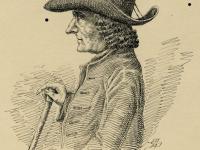Answer: He refused to take up arms against the British army during the Revolutionary War.
Born in Philadelphia in 1723, Pemberton was a well-read and well-traveled Quaker. He attended the Friends School of Philadelphia and worked most of his life as a merchant in the city. An active civic leader, Pemberton supported the rights and welfare of Native Americans and became president of the Pennsylvania Abolition Society in 1790.
Years earlier, however, Pemberton’s strongly held beliefs led to his brief exile from his home in Philadelphia (pictured at left). In 1756, he resigned from the Pennsylvania Assembly because the governor declared war on the Delaware Indians. A year later, Pemberton published a text in his defense called “An Apology for the People Called Quakers, containing some reasons for their not complying with human injunctions and institutions in matters relative to the worship of God.”
By the beginning of the Revolutionary War in 1776, Pemberton’s beliefs had not changed. After refusing to take up arms against the British army, he was banished to Winchester, Virginia in September 1777. Pemberton was one of twenty men, the majority of whom were prominent Quakers, exiled by the Commonwealth of Pennsylvania under instructions from the Second Continental Congress for perceived Loyalist sympathies.

